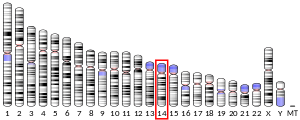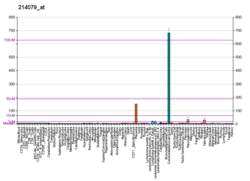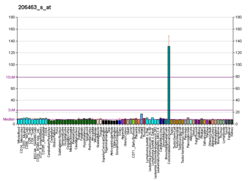DHRS2
Dehydrogenase/reductase SDR family member 2 is an enzyme that in humans is encoded by the DHRS2 gene.[3][4][5][6][7]
References
- 1 2 3 GRCh38: Ensembl release 89: ENSG00000100867 - Ensembl, May 2017
- ↑ "Human PubMed Reference:".
- ↑ Gabrielli F, Donadel G, Bensi G, Heguy A, Melli M (Nov 1995). "A nuclear protein, synthesized in growth-arrested human hepatoblastoma cells, is a novel member of the short-chain alcohol dehydrogenase family". Eur J Biochem. 232 (2): 473–7. doi:10.1111/j.1432-1033.1995.473zz.x. PMID 7556196.
- ↑ Heinz S, Krause SW, Gabrielli F, Wagner HM, Andreesen R, Rehli M (Apr 2002). "Genomic organization of the human gene HEP27: alternative promoter usage in HepG2 cells and monocyte-derived dendritic cells". Genomics. 79 (4): 608–15. doi:10.1006/geno.2002.6743. PMID 11944995.
- ↑ Shafqat N, Shafqat J, Eissner G, Marschall HU, Tryggvason K, Eriksson U, Gabrielli F, Lardy H, Jornvall H, Oppermann U (Jun 2006). "Hep27, a member of the short-chain dehydrogenase/reductase family, is an NADPH-dependent dicarbonyl reductase expressed in vascular endothelial tissue". Cell Mol Life Sci. 63 (10): 1205–13. doi:10.1007/s00018-006-6013-y. PMID 16685466.
- ↑ Persson B, Kallberg Y, Bray JE, Bruford E, Dellaporta SL, Favia AD, Duarte RG, Jornvall H, Kavanagh KL, Kedishvili N, Kisiela M, Maser E, Mindnich R, Orchard S, Penning TM, Thornton JM, Adamski J, Oppermann U (Feb 2009). "The SDR (short-chain dehydrogenase/reductase and related enzymes) nomenclature initiative". Chem Biol Interact. 178 (1–3): 94–8. doi:10.1016/j.cbi.2008.10.040. PMC 2896744. PMID 19027726.
- ↑ "Entrez Gene: DHRS2 dehydrogenase/reductase (SDR family) member 2".
Further reading
- Donadel G, Garzelli C, Frank R, Gabrielli F (1991). "Identification of a novel nuclear protein synthesized in growth-arrested human hepatoblastoma HepG2 cells". Eur. J. Biochem. 195 (3): 723–9. doi:10.1111/j.1432-1033.1991.tb15759.x. PMID 1847869.
- Maruyama K, Sugano S (1994). "Oligo-capping: a simple method to replace the cap structure of eukaryotic mRNAs with oligoribonucleotides". Gene. 138 (1–2): 171–4. doi:10.1016/0378-1119(94)90802-8. PMID 8125298.
- Suzuki Y, Yoshitomo-Nakagawa K, Maruyama K, et al. (1997). "Construction and characterization of a full length-enriched and a 5'-end-enriched cDNA library". Gene. 200 (1–2): 149–56. doi:10.1016/S0378-1119(97)00411-3. PMID 9373149.
- Pellegrini S, Censini S, Guidotti S, et al. (2002). "A human short-chain dehydrogenase/reductase gene: structure, chromosomal localization, tissue expression and subcellular localization of its product". Biochim. Biophys. Acta. 1574 (3): 215–22. doi:10.1016/s0167-4781(01)00323-2. PMID 11997086.
- Bauer K, Zemlin M, Hummel M, et al. (2002). "Diversification of Ig heavy chain genes in human preterm neonates prematurely exposed to environmental antigens". J. Immunol. 169 (3): 1349–56. doi:10.4049/jimmunol.169.3.1349. PMID 12133958.
- Strausberg RL, Feingold EA, Grouse LH, et al. (2003). "Generation and initial analysis of more than 15,000 full-length human and mouse cDNA sequences". Proc. Natl. Acad. Sci. U.S.A. 99 (26): 16899–903. doi:10.1073/pnas.242603899. PMC 139241. PMID 12477932.
- Ota T, Suzuki Y, Nishikawa T, et al. (2004). "Complete sequencing and characterization of 21,243 full-length human cDNAs". Nat. Genet. 36 (1): 40–5. doi:10.1038/ng1285. PMID 14702039.
- Gerhard DS, Wagner L, Feingold EA, et al. (2004). "The status, quality, and expansion of the NIH full-length cDNA project: the Mammalian Gene Collection (MGC)". Genome Res. 14 (10B): 2121–7. doi:10.1101/gr.2596504. PMC 528928. PMID 15489334.
External links
- DHRS2 human gene location in the UCSC Genome Browser.
- DHRS2 human gene details in the UCSC Genome Browser.
This article is issued from
Wikipedia.
The text is licensed under Creative Commons - Attribution - Sharealike.
Additional terms may apply for the media files.



